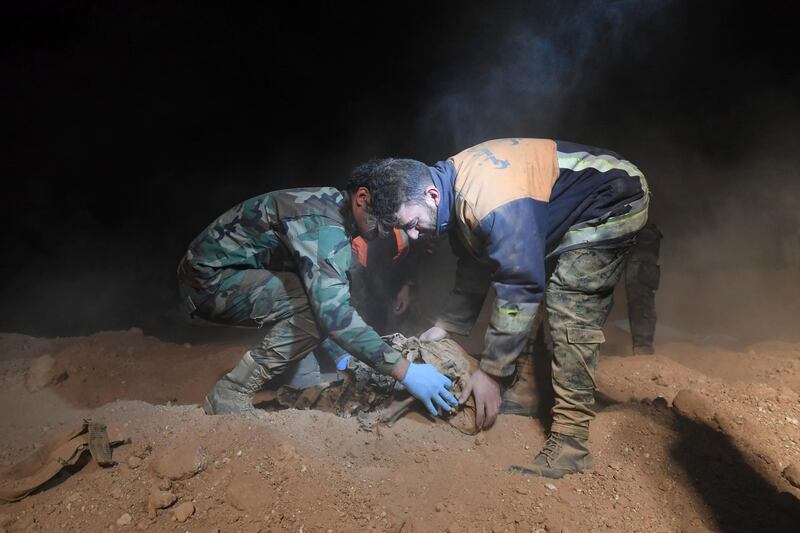Syrian government forces have found mass graves containing “tens of victims” of ISIL in north-western Syria, state media reported on Saturday.
The graves were discovered in Raqqa province, ISIL's former stronghold, but it was not clear when they had been dug. Excavation was continuing, state media said.
"After the army has regained Raqqa western countryside and expelled [ISIL] terrorists from the area, and following the return of families to their towns and villages, we received information by some families reporting the uncovering of two mass graves near Al Wawi town," a field commander told government news agency Sana.
More mass graves are expected to be found as the Syrian government’s forces re-establish control of areas captured from ISIL in recent months. In neighbouring Iraq, where the government declared victory over ISIL this month, dozens of mass graves were uncovered as the group retreated.
With ISIL largely defeated in Syria as well, president Bashar Al Assad's forces have turned their attention to rebels in the country's civil war that has lasted nearly seven years and left almost half a million dead. Fighting continued across the country on Saturday, particularly in Idlib, the north-western province that is the largest remaining rebel stronghold.
Syrian government forces, backed by Russian air support, launched a campaign to retake the province nearly two weeks ago.
At the same time, hundreds of militants belonging to an Al Qaeda-affiliated group were reportedly being transferred from the south-western side of Damascus to Idlib under a deal reached with the government. Hundreds more fighters from Fatah Tahrir Al Sham, as well as thousands of civilians from areas that had been under their control, have already been moved to Idlib this year under similar deals.
Samer Allawi, an officer in the Idlib-based rebel group Jaish Al Nasr, told The National that the transfers were intended to undermine the role of rebel groups like his which do not subscribe to an extremist interpretation of Islam.
"The effect is ... restricting all those who call for freedom and building a democratic state in the region of Idlib, and then killing them with aerial bombardment and from the sea and land. The international community is silent about what is happening to the Syrian people," Mr Allawi said.
The Syrian Observatory for Human Rights, a group that monitors the conflict, said negotiations for a similar transfer deal on the eastern side of Damascus had stalled as fighting intensified between government forces and militants on Friday after the completion of deal to hand over rebel-held prisoners in exchange for the evacuation of 29 critically ill people.
The string of suburbs known collectively as Eastern Ghouta has been under siege by government forces since 2013, and aid groups and the United Nations say hundreds more in the area are in need of treatment.
Reuters reported on Saturday that Russian president Vladimir Putin had sent a new year’s greeting to Mr Al Assad in which he promised continued support for the Syrian government.
Mr Putin stressed that Russia would "continue to render every assistance to Syria in the protection of state sovereignty, unity and territorial integrity, in the promotion of a political settlement process, as well as in efforts to restore the national economy".
Russia, which has long-standing military and economic ties to the Syrian government, began providing air and ground support to Mr Al Assad’s forces in 2015. It announced last week that it would retain a permanent military presence in Syria after the war ends.
The United States also has a military presence in Syria, deploying about 2,000 troops and providing air and artillery support to help the Syrian Democratic Forces, a militia dominated by Syrian Kurds, retake large parts of eastern Syria from ISIL.
On Friday, the US defence secretary Jim Mattis said he expected to see a larger US civilian presence in Syria, including contractors and diplomats.
"What we will be doing is shifting from what I would call an offensive, shifting from an offensive, terrain-seizing approach to a stabilising ... you'll see more US diplomats on the ground," Mr Mattis told reporters in remarks reported by Reuters.
"The United States is prepared to remain in Syria until we are certain that ISIL is defeated, stabilisation efforts can be sustained, and there is meaningful progress in the Geneva-based political process," said Brett McGurk, US special envoy to the global anti-ISIL coalition.
The UN has backed peace talks in Geneva, while Russia has sponsored its own talks in the Kazakh capital of Astana. Negotiations have largely faltered so far due to an impasse over whether Mr Al Assad would step down as part of a long-term peace plan.






